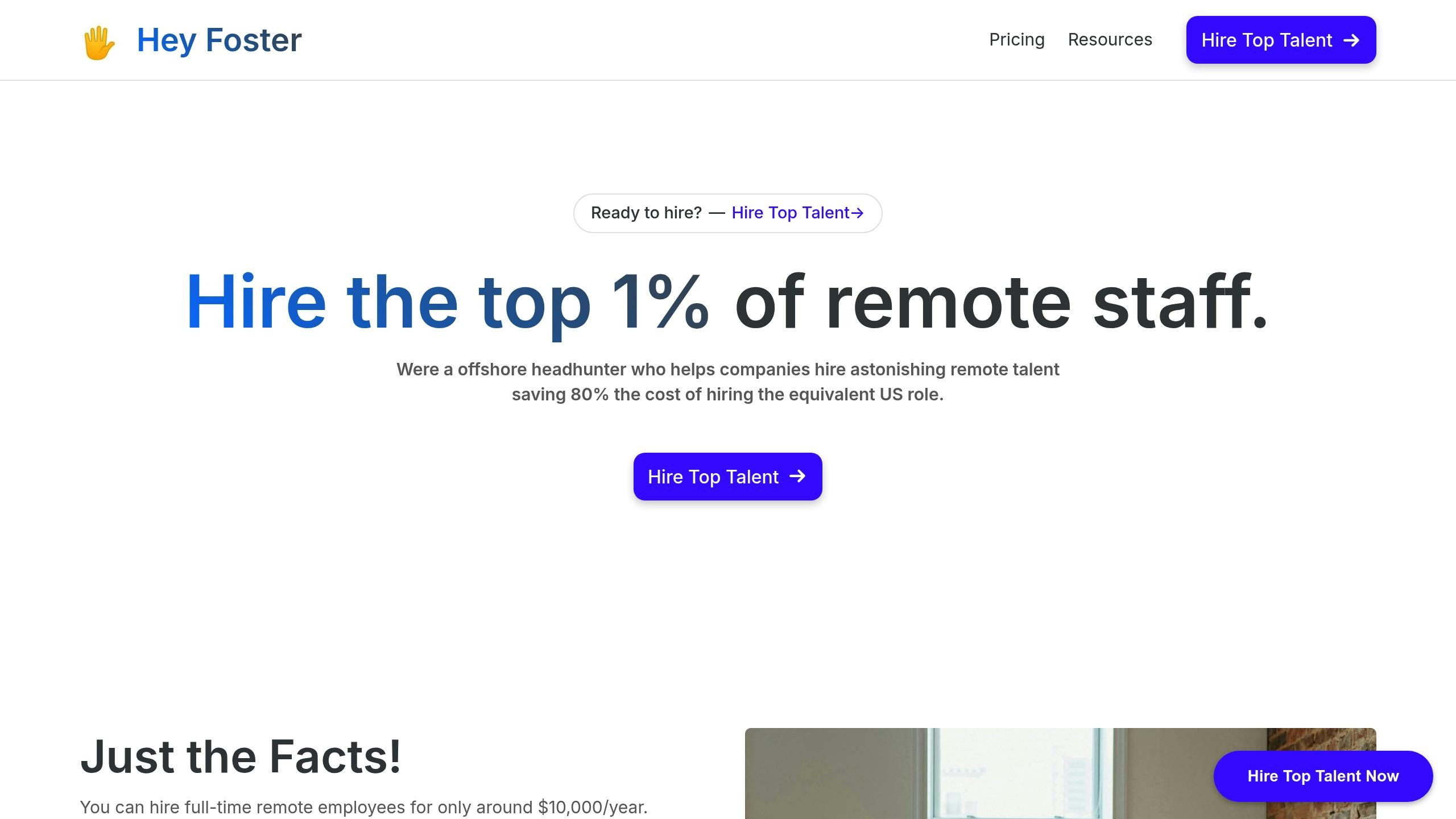How to Conduct Reference Checks for Offshore Hires

Reference checks for offshore hires verify remote work skills, communication, and team compatibility. They’re essential for avoiding costly hiring mistakes. But international reference checks can be tricky due to time zones, language barriers, and cultural differences. Here’s how to streamline the process:
- What to Collect: Get references’ contact info, professional relationship details, and preferred communication methods.
- Overcoming Barriers: Use tools like World Time Buddy for scheduling, share questions in advance, and prioritize video calls.
- Key Questions: Ask about remote work performance, time management, and collaboration across time zones.
- Red Flags: Watch for delayed responses, missed deadlines, or poor communication.
Use these steps to ensure your offshore hire fits your team and excels in a remote setup.
Related video from YouTube
Setting Up Your Reference Check Process
Creating a clear process for reference checks is essential when evaluating offshore candidates.
Information to Collect from Candidates
Before starting reference checks, ensure you have the following details from each candidate:
- Contact Information: Full name, current job title, and company of each reference.
- Professional Relationship: Details on how they worked together and for how long.
- Communication Preferences: Preferred contact methods, time zones, and language preferences.
- Work Context: A brief overview of shared projects or responsibilities.
- Number of References: Aim for at least three references, including two from previous supervisors or managers who can speak to the candidate's remote work experience.
Once you’ve gathered this information, focus on managing the challenges of international time zones and language differences.
Handling Time Zone and Language Barriers
Coordinating internationally can be tricky, but these tips can help:
- Use tools like World Time Buddy or Every Time Zone for scheduling.
- Add time zone details to calendar invites for clarity.
- Share your list of questions ahead of time, especially with non-native English speakers.
- Opt for video calls whenever possible to improve understanding and build rapport.
"Excellent English skills We source talent that possess strong English proficiency, ensuring seamless and effective communication for remote collaboration." - Hey Foster [1]
If managing this process feels overwhelming, consider outsourcing to experts.
Leveraging Hey Foster's Expertise

Agencies like Hey Foster can simplify the hiring process by offering services such as:
- Candidates pre-screened for English proficiency.
- Comprehensive background and skill checks.
- Assessments to ensure compatibility with remote work environments.
- A 6-month Right Match Promise for added peace of mind.
"Hey Foster made hiring offshore talent in the Philippines effortless. The process was smooth, the team was professional, and the quality of hires exceeded our expectations. Highly recommend!" - Billy Sandy, Real Estate Agent [1]
Running Reference Check Interviews
Conducting reference checks is a crucial step in evaluating a candidate's ability to thrive in a remote work environment. This process builds on your existing reference check framework, focusing on uncovering insights about their remote work skills and ability to collaborate effectively.
Key Questions to Ask References
Use these specific questions to verify a candidate's qualifications and suitability for remote work:
Professional Skills and Performance
- How did [candidate name] handle deadlines and time-sensitive tasks?
- Can you describe their communication style and English proficiency during meetings?
- What tools did they use to track tasks and report progress?
Remote Work Abilities
- How did they stay productive and manage their time effectively?
- What strategies did they use to collaborate across time zones?
- How did they handle technical challenges or connectivity issues?
Cultural Integration
- How well did they work with international team members?
- How did they approach feedback and resolve conflicts?
- Can you share an example of how they addressed cultural misunderstandings?
Confirming Reference Authenticity
Before diving into the feedback, ensure the references are legitimate by taking these steps:
Company Verification
- Cross-check references on LinkedIn and official company websites.
- Request communication through corporate email addresses to validate their identity.
Documentation Review
- Ask for detailed project information, team structures, and employment dates to confirm the candidate's role and contributions.
Once the references are verified, focus on interpreting the feedback to understand the candidate's remote work performance.
Analyzing Feedback on Remote Work Skills
Pay special attention to these core areas when evaluating feedback:
Communication Skills
- Clarity in both written and verbal communication.
- Familiarity with communication tools and platforms.
- Evidence of proactive updates and transparency.
Self-Management
- Ability to meet deadlines without supervision.
- Initiative in taking on and completing projects.
- Maintaining boundaries between work and personal life.
Technical Skills
- Proficiency with remote collaboration tools.
- Problem-solving ability for technical challenges.
- Effectiveness in asynchronous communication.
These insights will help you determine whether the candidate is equipped to succeed in a remote work setting.
Using Reference Check Results
After gathering insights from interviews, reference feedback can serve as a powerful tool to help evaluate offshore candidates more thoroughly.
Warning Signs in References
Be on the lookout for these potential red flags during reference checks:
- Not being available during agreed-upon hours
- Taking more than 24 hours to respond to communications
- Repeated issues with system setups
- Deliverables that are incomplete or deadlines that are missed
- Struggles to work effectively within a team
Combining References with Other Assessments
Reference feedback works best when paired with other evaluation tools. Here’s a simple breakdown:
| Assessment Type | Weight | Key Evaluation Points |
|---|---|---|
| Reference Checks | 30% | Performance, reliability, communication |
| Technical Tests | 25% | Tool proficiency, problem-solving |
| Cultural Fit Interview | 25% | Team compatibility, ability to adjust |
| Portfolio Review | 20% | Quality of work, ability to complete tasks |
If reference feedback doesn’t align with other assessments, consider scheduling additional screening calls to clear up any inconsistencies.
Handling Mixed or Unclear Feedback
When feedback from references is unclear or mixed, try these steps to dig deeper:
- Ask for specific examples tied to measurable outcomes.
- Evaluate the feedback based on the responsibilities of the role.
- Arrange short follow-up calls to clarify vague points and document the details.
Sometimes, what seems unclear may simply reflect the reference's communication style rather than the candidate's actual performance.
Digital Tools for Reference Checks
Digital tools make reference checks for offshore candidates more efficient by automating tasks like scheduling and simplifying communication across borders. These tools are designed to handle challenges such as time zone differences and language barriers.
Reference Check Software Features
Here are some key features to look for when choosing software for reference checks with offshore candidates:
| Feature | Function | Benefit for Offshore Hiring |
|---|---|---|
| Automated Scheduling | Handles time zone complexities | Makes scheduling smoother and faster |
| Multi-language Support | Enables communication in various languages | Improves understanding and response accuracy |
When evaluating software, focus on tools that excel in managing time zones and offer multilingual support to ensure seamless international communication.
Conclusion: Reference Check Guidelines
Main Steps Review
When hiring offshore talent, reference checks are crucial for verifying remote work skills and ensuring the candidate aligns with your team's culture. Here's a breakdown of the key steps involved:
| Step | Key Actions | Purpose |
|---|---|---|
| Information Collection | Gather accurate reference contact details | Ensure references are legitimate |
| Schedule Management | Coordinate interviews across time zones and organize responses | Streamlines communication |
| Documentation | Record all feedback in one centralized system | Supports compliance and makes comparisons easier |
| Follow-up | Address any unclear or conflicting feedback | Ensures a thorough evaluation |
These steps form the backbone of an effective reference check process. Let’s look at additional tips to refine your approach.
Tips for Success
To minimize hiring risks and find top-tier candidates, pay attention to these details that are critical for remote work:
Work with agencies like Hey Foster: They can simplify the reference-checking process and ensure candidates are suited for remote roles.
Ask references about key skills: Focus on areas like:
- Proficiency with virtual collaboration tools
- Ability to self-manage across time zones
- Communication skills in a distributed team setup
- Adaptability to Western work styles
Standardize your documentation: Use digital tools to manage the process. This ensures:
- Fair and consistent evaluations
- Compliance with global data privacy laws
- Easy comparison between candidates
- A clear record for decision-making